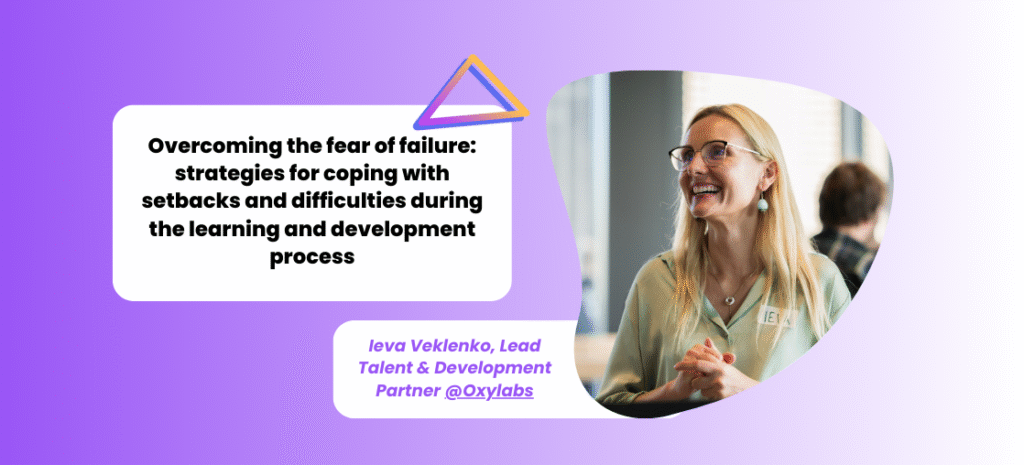|
Getting your Trinity Audio player ready…
|

Fear of failure can freeze even the most motivated people. So how do you move anyway? We asked Ieva Veklenko, Lead Talent & Development Partner at Oxylabs, to share the reframes and routines that help her turn setbacks into growth.
Can you share a moment when fear of failure almost stopped you – and what you learned?
I’ve had many. The most vivid was early in my career. I was growing in my role when an opportunity came up to run a training for senior leadership. In my head it felt like a “make it or break it” moment. I said yes before I felt ready.
Then I did the work. I prepared properly, stayed humble, and focused on the value I was creating – not on myself. I didn’t chase perfection. The project went well, and that was the moment my career snowballed.
What reframing helps you see setbacks as part of growth, not defeat?
I use one question like a mantra: “What is this situation trying to teach me?” That keeps me out of self-criticism and helps me shift my mind into more productive thinking.
Also, my mentors and the trusted circle of people keep reminding me to zoom out: “Will this matter in five years?” Most of the time, no. And there’s a quote by Brené Brown that I find incredibly inspiring and valuable: “I’m not here to be right, I’m here to get it right.” It shifts me from perfectionism to moving forward and growing.
How do you process negative feedback?
Earlier in my career, negative feedback would really sting. But over time, I’ve learned to filter and process it. What really helps me now is my trusted network that challenges me without sugarcoating while being supportive at the same time. Their feedback matters.
I’m also selective. You don’t have to take in everything. Sometimes feedback says more about the giver than about you. When I’m unsure, I bring feedback to my circle to validate, double-check, and then act on it.
How do you build that kind of trusted network?
I’d say it happens naturally — people in your professional (or personal) environment see you in action in both good and tough moments. You take proactive steps first: offer support, attention, and feedback to others who want it. Then, they’re extremely likely to return that energy. That’s how you create “accountability buddies.”
My advice – keep your trusted network eclectic. Mix mindsets and professional backgrounds. Diversity in perspectives makes the feedback sharper and more useful.
Many people get stuck overthinking the worst outcome. How do you keep moving when the path feels risky?
I write down three scenarios: worst case, most likely, and best case.
Putting the worst case on paper shows me what I can and cannot influence. And usually the worst case isn’t catastrophic – you come to the realization that you can deal with it.
Then I visualize the best case. That’s where the reframing happens. It gives me energy, ideas, and motivation to make that best case more likely.
How do you stay resilient?
I remind myself to focus on progress over perfection. Too much perfectionism can break your confidence and paralyze you.
I also practice rethinking, a habit I picked up from Adam Grant’s Think Again. When you keep questioning your assumptions and strategies, you come back stronger and more open the next time. That’s resilience in action.
If you’re navigating fear while you grow your career, you’re not alone. At Oxylabs, you’ll find learning resources, candid feedback, and a team that backs your progress – not perfection. Ready for the next step? Explore their open roles and say hello.
